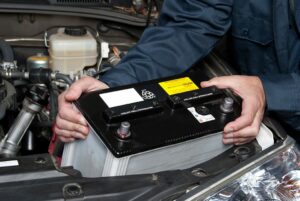When buying a new battery for your car, 4WD, SUV, Truck, or motorbike, you’ll naturally want it to last as long as possible. So that begs the question, how long should your car battery last?
The answer is not as straightforward as one might hope as car battery life can vary from battery to battery, and the way you use, store and maintain your battery. All these factors can and will impact the battery lifespan. At Marshall Batteries, we back our batteries with nationwide express warranties to cover any manufacturing faults that could cause them to fail.
Keep reading for our advice on how long your battery should last, and how to keep it in tip-top shape.
Table of Contents
What is the average lifespan of a car battery?
Your average car battery may last between 3 and 5 years, provided it is well maintained and correctly installed. Once a battery reaches 3 years of use, it may well be worth having it tested. Marshall Batteries offer FREE Battery testing at many of our stores, so just Holler.
A fully charged battery should read approx. 12.6 volts on a multi-meter, or between 13.7 to 14.7 while the engine is running. If you don’t have a multimeter, you can do a rough test by checking your vehicle’s headlights.
How to check if your car battery needs replacing
To run a simple headlight test for checking battery health:
1. Park in front of a reflective surface, like a garage door, wall or window. Turn on your headlights
2. Observe the headlights reflections as you try to start the vehicle.
3. If the headlights dim significantly when you start the car, or even go out completely, this suggests the battery doesn’t have sufficient charge.
Other signs of battery failure include the vehicle failing to start at all or turning over very slowly, or a rapid clicking sound from the starter.
Looking for more signs? Read our blog post on how to know if your battery is dead.
Why is my car battery dead?
There’s a great number of factors that can cause your car battery to fail earlier than expected. If you’re trying to work out where you went wrong, or you’re just looking to make your battery last as long as possible, these are a few things that influence battery life.
Excessive discharge
All batteries slowly discharge when not in use – it’s a fact of life. For deep cycle batteries, this isn’t as great an issue as they are designed for longer, slower discharge down to around 50%.
However, car batteries are typically what’s known as starter or starting batteries. Basically, these batteries are intended for short bursts of power, such as starting your car, they are sometimes referred to as cranking batteries. Once your car is started, the alternator kicks in and maintains the battery’s charge.
Starter batteries are not intended to be discharged below 80%, and if they fall below this level they may struggle to start your car. When this happens, you’ll generally need to recharge the battery or get a jump-start to get you going. It’s always best to have your battery properly re-charged on a battery charger after it has been drained or gone flat.
Climate
Unfortunately, batteries aren’t all made to withstand the same conditions. Extreme heat and cold can both have negative impacts on your battery’s lifespan, especially if your chosen battery is not designed to hold up against those temperatures.
A standard lead acid battery works by way of a chemical reaction, where lead plates in electrolyte liquid react and produce an electrical charge. Like most chemical reactions, this is accelerated by heat. While this may sound like a good thing for the starting power of your battery, heat will also speed up the internal corrosion caused by this reaction, and in turn permanently reduce the lifespan of your battery.
Meanwhile, excessive cold can harm your battery too. You may notice that your battery struggles to start your car in, especially cold temperatures. This is a normal effect of the cold, but it starts to become a problem when your battery’s charge is very low. A significantly discharged battery can freeze at temperatures as high as -1° C. If this happens, the liquid in the battery will expand and may do irreparable damage to the battery. Leading battery design, robust internal parts, battery case thickness, and quality additives all go a long way to making Marshall Batteries longer lasting and better value.
Vibration
Vibration as a result of bumpy or unsealed roads can contribute to battery damage. Frequent vibration around your battery can cause its internal components to deteriorate more quickly.
Furthermore, severe vibration can cause hardware like the battery hold down clamp or even the battery connections themselves to come loose, or even disconnect! An insecure battery is not ideal, and potentially very dangerous. The positive post or terminal may cause a short circuit if it comes into contact with any metal on the vehicle body, and that could start a fire or cause other serious damage.
Maintenance
Most batteries today are maintenance-free, meaning you don’t have to do anything to do the internal components (like topping up water levels). That’s great news, but it doesn’t mean you shouldn’t do your best to look after the exterior components of your car battery. Keep the battery as clean as possible.
In particular, look for corrosion. Corrosion around a battery’s terminals doesn’t mean the battery is dying, but if left alone it can eat away at the terminal and render it useless. Even mild corrosion can cause poor electrical connections and increase electrical resistance, which is not a good thing!
Short car trips
Your car’s alternator exists to recharge the starting battery after you start the car, but it needs time to do this. Frequent short trips mean that you’ll likely be starting your vehicle, which causes a short quick discharge, and then not giving the alternator enough time to restore the charge used. Over time, this charge deficit has a cumulative effect, and the battery slowly gets more & more drained. The solution is a battery charger to maintain high levels of charge on your battery. They are cheap, effective, and easy to use.
How to make your car battery last as long as possible
Knowing why your battery is dead is half of the battle. The next step is to make sure your new battery lasts as long as it should. Here are a few simple tips to give your car battery the best lifespan possible.
For more suggestions, read our 9 top tips for maintaining your car battery.
Leave your car fully charged
It’s best to leave your car fully charged when the engine isn’t running. This means your accessories like USB phone chargers, air conditioning, car stereo, and lights should all be turned off when the motor is switched off.
A starting battery is simply not designed to run accessories when the alternator isn’t running. This creates a significant drain on the battery, which can drop it below 80% charge and impact its starting power. Furthermore, if you leave these systems running for a while, and then turn off your car, the battery will be closer to full discharge and continue depleting while idle.
If you’re camping or boating often, and are likely to use those extra accessories a lot, consider purchasing a separate deep cycle battery to power appliances like your car fridge.
Don’t leave your car sitting for too long
Your car’s battery will discharge slowly over time even when it’s not in use. So, if you’re someone who doesn’t need to drive around much, it’s worth taking your car out for a spin every now and then just to maintain the battery’s health.
If you’re not likely to do this, consider purchasing a battery charger or trickle charger. This is a small device that can be hooked up to your battery when it’s not in use, to deliver a slow, consistent charge and keep the battery fully charged.
Check your battery regularly
Checking on your car battery is a great habit to form. Every month or so, check your battery is secure and all terminals and connections are tight. Whilst there, also check the terminals of the battery for any signs of corrosion. This will look like a white powdery substances on the terminals and inside the cable clamps. If there’s any corrosion, don’t stress, it’s only a matter of cleaning the terminals.
Follow these steps to remove corrosion:
1. Start by ensuring the car is turned off.
2. Disconnect the terminals, starting with the negative terminal, then the positive.
3. Using a concentrated solution of baking soda and water, scrub the corrosion until it disappears. Be sure to clean the clamps as well to get the best connection possible.
4. Dry everything with a clean cloth.
5. Reconnect the positive terminal, followed by the negative.
While checking your battery, you should also look for signs of damage such as bulging, cracking or warping.
You might also like to perform a voltage test using a multimeter, to ensure your battery is properly charged. If it isn’t, consider using a trickle charger to get it back into shape.
Choose the right battery
Choosing the right battery for your vehicle and circumstances is crucial to getting the biggest bang for your buck.
Your car will likely be limited in the size of battery it can take, according to its model, make and engine type. However, consider the available cold cranking amps (CCA) in your battery size group if you’re living in particularly cold conditions. A higher CCA, often found in heavy duty batteries, will mean that your battery is able to perform better in sub-zero temperatures.
Above all, you’ll need to be sure the battery you’re selecting meets or exceeds the Original Equipment Manufacturer (OEM) requirements – that is, the requirements set by the car’s manufacturer. For example, your car will need a minimum amp hour (AH) rating, and might require specific technology such as a Start/Stop battery.
Choosing the wrong battery can cause your car’s internal systems to malfunction, and in turn kill your battery prematurely. We can help you so just Holler or visit our battery selector.
Need help with your car battery?
If you aren’t sure what battery is right for your car, request a quote from Marshall Batteries and we’ll be happy to help.
Or, if you’re on the go but your vehicle has other ideas, Holler for a Marshall on 1300 627 742 and we’ll be there with 24/7 roadside assistance, fast, safe mobile battery replacement on the go! Or for a free battery test, visit your nearest Marshall Battery Shop.


